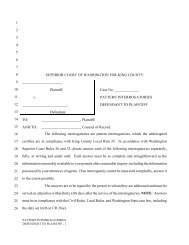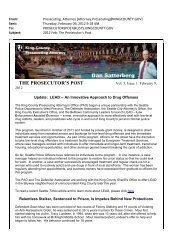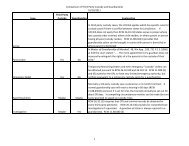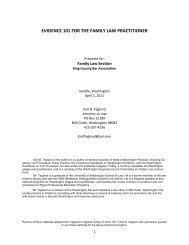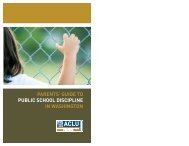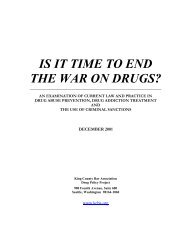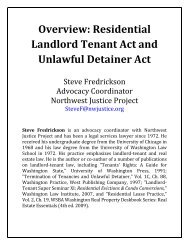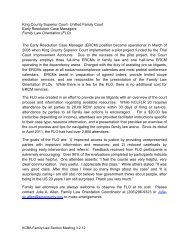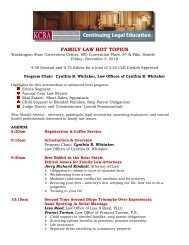Effective Drug Control: Toward A New Legal Framework
Effective Drug Control: Toward A New Legal Framework
Effective Drug Control: Toward A New Legal Framework
Create successful ePaper yourself
Turn your PDF publications into a flip-book with our unique Google optimized e-Paper software.
http://www.americanheart.org/presenter.jhtml?identifier=11223.<br />
453 Dan Morgan and Helen Dewar, “House Blocks FDA Oversight of Tobacco,” The Washington Post,<br />
October 12, 2004, p. A4.<br />
454 Carl Hulse, “Senate Approves Tobacco Buyout and <strong>New</strong> Curbs,” The <strong>New</strong> York Times, July 16, 2004,<br />
p.A1.<br />
455 RCW 69.41.<br />
456 RCW 69.50.<br />
457 Gina Kolata, “There’s a Blurry Line Between Rx and O.T.C.,” The <strong>New</strong> York Times, Dec. 21, 2003,<br />
p.A3.<br />
458 Don Williams, Executive Director, Washington State Board of Pharmacy, “Introduction to Pharmacy &<br />
Licit <strong>Drug</strong> Regulation,” presentation to King County Bar Association <strong>Legal</strong> <strong>Framework</strong>s Group, March 27,<br />
2003.<br />
459 The King County Bar Association stated in 2001 that any state sanction or remedy related to drug use<br />
should be aimed at reducing the harm directly caused to others by persons using drugs, rather than<br />
criminally punish persons for drug use per se, and that civil remedies, supported by a court’s contempt<br />
power, are already available to be imposed on persons who use drugs to the detriment of others. King<br />
County Bar Association (2001), Is It Time to End the War on <strong>Drug</strong>s?, Seattle, Washington, p. 24.<br />
460 RCW 70.96A.140(1): When a designated chemical dependency specialist receives information alleging<br />
that a person presents a likelihood of serious harm or is gravely disabled as a result of chemical<br />
dependency, the designated chemical dependency specialist, after investigation and evaluation of the<br />
specific facts alleged and of the reliability and credibility of the information, may file a petition for<br />
commitment of such person with the superior court, district court, or in another court permitted by court<br />
rule.<br />
461 RCW 71.05.040: Persons who are developmentally disabled, impaired by chronic alcoholism or drug<br />
abuse ... shall not be detained for evaluation and treatment or judicially committed solely by reason of that<br />
condition unless such condition causes a person to be gravely disabled or as a result of a mental disorder<br />
such condition exists that constitutes a likelihood of serious harm: Provided however, That persons who are<br />
developmentally disabled, impaired by chronic alcoholism or drug abuse, or suffering from dementia and<br />
who otherwise meet the criteria for detention or judicial commitment are not ineligible for detention or<br />
commitment based on this condition alone... The legislative intent statement for RCW 71.05 (mental<br />
illness) would be a good starting point for reforming Washington’s policy toward drug users:<br />
The provisions of this chapter are intended by the legislature:<br />
(1) To prevent inappropriate, indefinite commitment of mentally disordered persons and to eliminate<br />
legal disabilities that arise from such commitment;<br />
(2) To provide prompt evaluation and timely and appropriate treatment of persons with serious mental<br />
disorders;<br />
(3) To safeguard individual rights;<br />
(4) To provide continuity of care for persons with serious mental disorders;<br />
(5) To encourage the full use of all existing agencies, professional personnel, and public funds to<br />
prevent duplication of services and unnecessary expenditures;<br />
(6) To encourage, whenever appropriate, that services be provided within the community;<br />
(7) To protect the public safety.<br />
RCW 71.05.010.<br />
462 RCW 26.09.191(3) (Restrictions in temporary or permanent parenting plans): A parent's involvement or<br />
conduct may have an adverse effect on the child's best interests, and the court may preclude or limit any<br />
provisions of the parenting plan, if any of the following factors exist: ... (c) A long-term impairment<br />
resulting from drug, alcohol, or other substance abuse that interferes with the performance of parenting<br />
functions.<br />
463 RCW 26.44.170(3) (abuse and neglect): If a determination is made under subsection (1) of this section<br />
that there is probable cause to believe abuse of alcohol or controlled substances has contributed to the child<br />
abuse or neglect, the department shall, within available funds, cause a comprehensive chemical dependency<br />
evaluation to be made of the person or persons so identified. The evaluation shall be conducted by a<br />
physician or persons certified under rules adopted by the department to make such evaluation. The<br />
department shall perform the duties assigned under this section within existing personnel resources.



